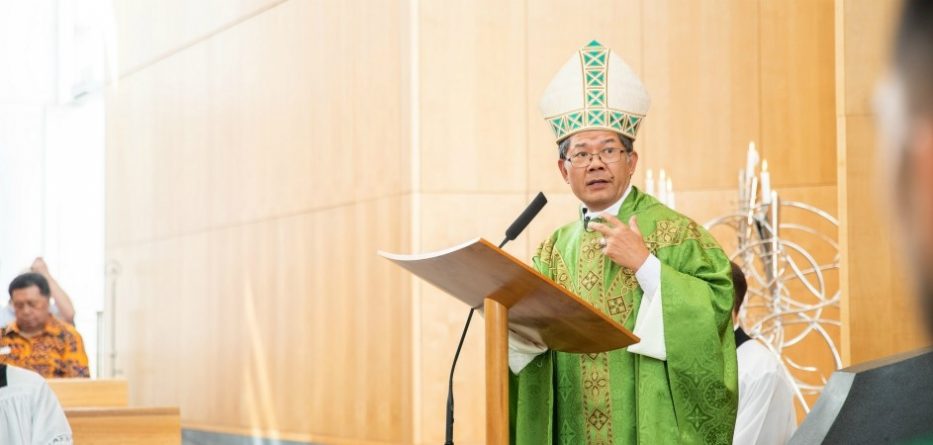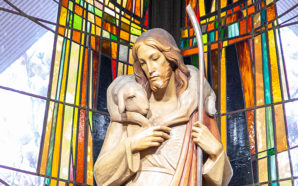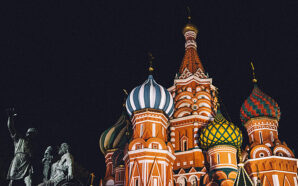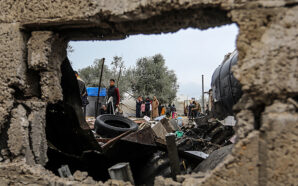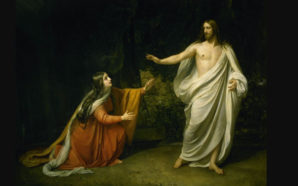Most Reverend Vincent Long Van Nguyen OFM Conv DD STL, Bishop of Parramatta
Homily for the Solemnity of Pentecost Year C 2019 at Vigil Mass at Our Lady of Mount Carmel Parish, Wentworthville
Readings: Acts 2:1-11; Cor 12:3-7; John 20:19-23
9 June 2019
Pentecost: Out of vulnerability, the Church becomes a leaven for the Kingdom
Dear friends,
I did not follow closely the Court of Appeal proceedings that took place in Melbourne during the week. However, there was an image that I found particularly confronting. It was the image of Cardinal George Pell in handcuffs as he was led by the prison guards into the courthouse.
Quite apart from everything else, it was a graphic reminder that the Catholic Church in this country is in deep crisis.
However, the result of the appeal is going to be, the Church’s collective task of healing hurts, mending hearts and restoring confidence is formidable, if not impossible.
In the midst of the uncertainty, confusion and malaise, we are strengthened by the belief that great crises can be opportunities and catalysts for renewal and transformation. Throughout our history, the Church is constantly called to nurture hope in despair, to read the signs of the times, to discern and to chart a new pathway into the future into which God beckons us.
The Feast of Pentecost that we are celebrating today is the critical moment that catalysed a small and vulnerable group of followers into a dynamic evangelising community.
We are told that after the crucifixion, the disciples gathered in a state of fear and disarray. There was pressure from outside. They were marginalised and persecuted by many hostile forces. But there was also a deep sense of failure and betrayal from within. The disciples were confronted with their own misguided ambitions and weaknesses. Yet, it was into this very moment of vulnerability that the Holy Spirit came and transformed them into a leavening force for the Kingdom.
The disciples were humbled by their own failings. They learned to put to rest the human desire for power and dominance. They learned to embrace and live the vulnerable trust and the powerlessness of the Servant-Master. It was their faith in him, not the size of their numbers, not the strength of their resources, not the popularity of their cause that determined the outcome of their mission. In fact, the Church was born not out of worldly triumph but out of a sense of vulnerability.
The Acts of the Apostles tells us that after the tongues of fire had rested on them, they began to speak in the languages that people from all over the world could understand. Pentecost, thus, reverses the situation at the Tower of Babel where people were divided on account of their differences. The Church as a community of disciples is given the task of bridging the gaps and bringing down the barriers that separate people. We are called to embody the Spirit who transcends all boundaries and divisions.
This is the inspiration for us today as we grapple with the disconcerting situation. In many ways, we are witnessing the passing of the old and emergence of the new. We mourn the loss of many things: wealth, status, power as well as vitality, strength and credibility. But we are hopeful of a new beginning: the Church that is poor, humble – or in the words of Pope Francis – wounded and bruised but more decisively aligned to the radical vision of Christ.
After all, the mission of the Church is not about asserting its dominant position or wielding power in the world. Rather, it is about the transformation of society, people’s lives and relationships through the quality of its witness.
The early Church was poor, few in numbers, marginalised by the dominant society and persecuted by the power that be. Yet it was a powerhouse of prayer, love and solidarity. It was a community that supported and cared for the most vulnerable. It was a community of unity in diversity, radical equality and inclusion where old boundaries were transcended. They showed to the world that it was possible to live with fraternal concern, compassion and communion.
The Church today must honour this founding memory by its radical outreach and witness. We too must seek fresh ways of transcending artificially constructed boundaries and embodying God’s all-embracing love. It is our Pentecostal mandate.
Dear friends,
We are living in a world that at times resembles the division at Babel rather than the harmony at Jerusalem on the day of Pentecost. In a world which is increasingly hostile and intolerant towards differences, we need to be connected with the same spirit who transcends all divisions.
Thus, Pentecost commits us to being messengers of peace and reconciliation. Pentecost challenges us to be a church, which is a model for the wider society. In other words, we are called to be a community where the spirit of unity in diversity is evident. We need to demonstrate in practical terms that our common faith, common baptism, common spirit does bind us in a bond of love and friendship.
At Pentecost, Mary and the disciples of Jesus gathered and discerned their future in the light of Jesus’ death, resurrection, and ascension. The Holy Spirit emboldened and launched them forward as a leavening force in the world. As we gather today and discern our life of faith, may we also be bolstered by the fresh energy that the Holy Spirit.
May we also be emboldened to go forward and witness to the reign of God, becoming the sign of hope and reconciliation for the people of our time.




